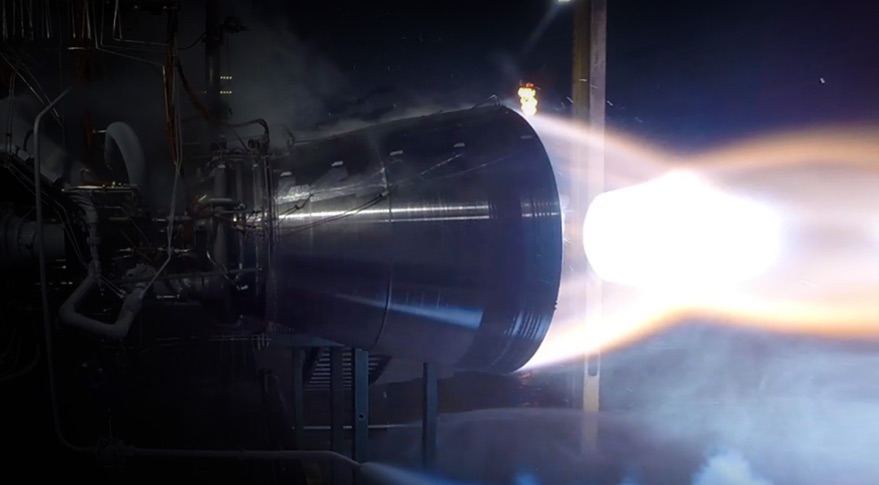ULA Selects Blue Origin to Provide Main Engine for New Vulcan Rocket

Updated 8:40 p.m. Eastern.
WASHINGTON — United Launch Alliance announced Sept. 27 that it has selected Blue Origin to provide the main engine for its next-generation Vulcan launch vehicle, a decision long expected by the industry.
In a statement, ULA said it will use a pair of Blue Origin BE-4 engines, using liquid oxygen (LOX) and liquefied natural gas (LNG) in the first stage of its Vulcan rocket, expected to make a first launch in mid-2020. The company did not disclose the terms of its agreement with Blue Origin.
"We are pleased to enter into this partnership with Blue Origin and look forward to a successful first flight of our next-generation launch vehicle," said Tory Bruno, president and chief executive of ULA, in a statement. [Watch Blue Origin Fire Up Engine for Huge New Glenn Rocket (Video)]
"Today is a great day for the Blue Origin team. We are very honored that United Launch Alliance has selected Blue Origin's LOX/LNG BE-4 as the engine that will power the first stage of their Vulcan rocket," said Bob Smith, chief executive of Blue Origin, in a company statement. "We can't thank Tory Bruno and the entire United Launch Alliance team enough for entrusting our engine to power Vulcan."
The announcement comes four years after the companies first announced their partnership to develop the BE-4. While ULA also considered the AR1 engine being developed by Aerojet Rocketdyne, Bruno long made clear that BE-4 was the front-runner to power Vulcan.
In an April 2017 interview, Bruno said he was waiting for Blue Origin to complete a set of tests of the BE-4 before making a decision. "The economic factors are largely in place now and the thing that is outstanding is the technical risk," he said at the time.
Get the Space.com Newsletter
Breaking space news, the latest updates on rocket launches, skywatching events and more!
Blue Origin first hotfired the BE-4 in an October 2017 test, and since then has gradually ramped up the test campaign.
"It's performing quite well," Smith said of BE-4 on a Sept. 11 panel at the World Satellite Business Week in Paris. "We've gone through several hundred seconds of firing, including an over 200-second firing of that engine, so we're feeling very good about its progress and what we're going to be able to deliver to the market, as well as for our own consumption."
However, ULA remained tight-lipped about when it would pick an engine, with Bruno saying only that a decision would come "soon" or, more recently, "very soon."
Blue Origin joins an industry team that includes Aerojet, who will provide the RL10 engine for the rocket's upper stage, Northrop Grumman for solid-fuel strap-on boosters, L-3 Avionics Systems for the rocket's avionics and Ruag for the rocket's payload fairing.
"ULA has chosen the best systems available to create the Vulcan Centaur," Bruno said in the statement. "These engines and components will ensure ULA continues to lead the way in space exploration, maintain our record of success and remain America's launch vehicle for our nation's most vital missions."
Aerojet officials have played down the AR1 competition more recently, particularly after renegotiating an agreement with the Air Force that slows down engine development. The company now says the AR1 could serve as a main engine for future medium-class launch vehicles, although no such vehicles have yet been identified.
"A medium-class launch vehicle powered by a single AR1 is ideally suited to become a new workhorse rocket for the nation," Aerojet spokesman Steve Warren said Sept. 24. "AR1 is the ideal engine for many possible solutions; it brings the right thrust level, size and performance to a wide variety of launch vehicles."
This story was provided by SpaceNews, dedicated to covering all aspects of the space industry.
Join our Space Forums to keep talking space on the latest missions, night sky and more! And if you have a news tip, correction or comment, let us know at: community@space.com.

Jeff Foust is a Senior Staff Writer at SpaceNews, a space industry news magazine and website, where he writes about space policy, commercial spaceflight and other aerospace industry topics. Jeff has a Ph.D. in planetary sciences from the Massachusetts Institute of Technology and earned a bachelor's degree in geophysics and planetary science from the California Institute of Technology. You can see Jeff's latest projects by following him on Twitter.










